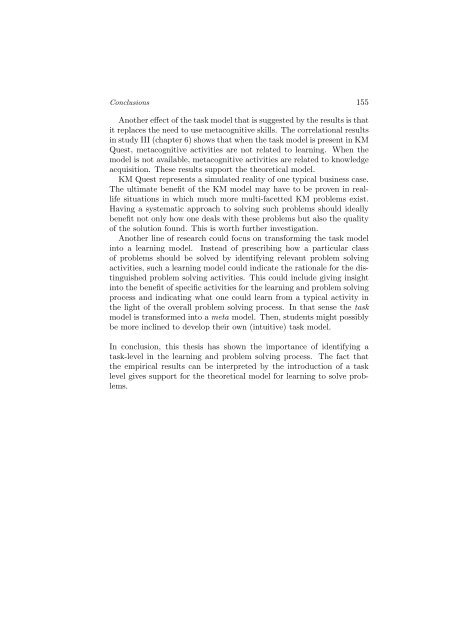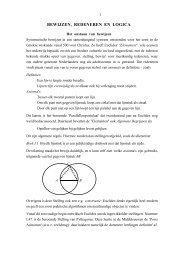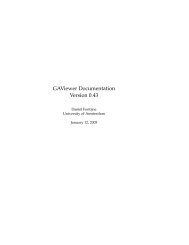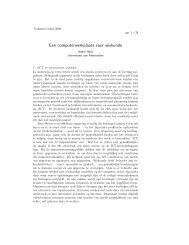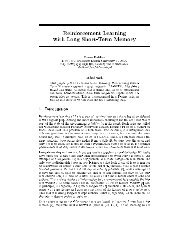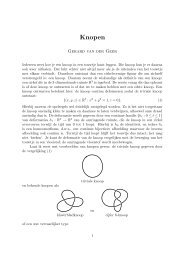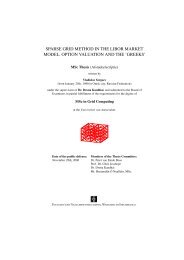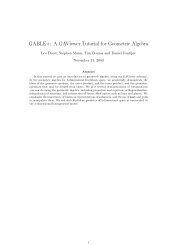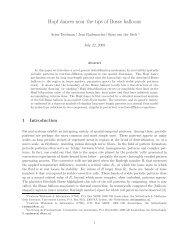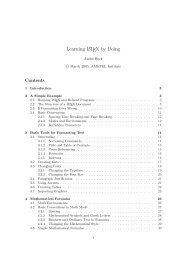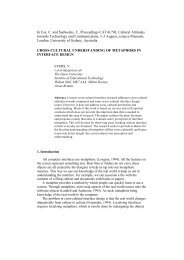The role of metacognitive skills in learning to solve problems
The role of metacognitive skills in learning to solve problems
The role of metacognitive skills in learning to solve problems
You also want an ePaper? Increase the reach of your titles
YUMPU automatically turns print PDFs into web optimized ePapers that Google loves.
Conclusions 155<br />
Another effect <strong>of</strong> the task model that is suggested by the results is that<br />
it replaces the need <strong>to</strong> use <strong>metacognitive</strong> <strong>skills</strong>. <strong>The</strong> correlational results<br />
<strong>in</strong> study III (chapter 6) shows that when the task model is present <strong>in</strong> KM<br />
Quest, <strong>metacognitive</strong> activities are not related <strong>to</strong> learn<strong>in</strong>g. When the<br />
model is not available, <strong>metacognitive</strong> activities are related <strong>to</strong> knowledge<br />
acquisition. <strong>The</strong>se results support the theoretical model.<br />
KM Quest represents a simulated reality <strong>of</strong> one typical bus<strong>in</strong>ess case.<br />
<strong>The</strong> ultimate benefit <strong>of</strong> the KM model may have <strong>to</strong> be proven <strong>in</strong> reallife<br />
situations <strong>in</strong> which much more multi-facetted KM <strong>problems</strong> exist.<br />
Hav<strong>in</strong>g a systematic approach <strong>to</strong> solv<strong>in</strong>g such <strong>problems</strong> should ideally<br />
benefit not only how one deals with these <strong>problems</strong> but also the quality<br />
<strong>of</strong> the solution found. This is worth further <strong>in</strong>vestigation.<br />
Another l<strong>in</strong>e <strong>of</strong> research could focus on transform<strong>in</strong>g the task model<br />
<strong>in</strong><strong>to</strong> a learn<strong>in</strong>g model. Instead <strong>of</strong> prescrib<strong>in</strong>g how a particular class<br />
<strong>of</strong> <strong>problems</strong> should be <strong>solve</strong>d by identify<strong>in</strong>g relevant problem solv<strong>in</strong>g<br />
activities, such a learn<strong>in</strong>g model could <strong>in</strong>dicate the rationale for the dist<strong>in</strong>guished<br />
problem solv<strong>in</strong>g activities. This could <strong>in</strong>clude giv<strong>in</strong>g <strong>in</strong>sight<br />
<strong>in</strong><strong>to</strong> the benefit <strong>of</strong> specific activities for the learn<strong>in</strong>g and problem solv<strong>in</strong>g<br />
process and <strong>in</strong>dicat<strong>in</strong>g what one could learn from a typical activity <strong>in</strong><br />
the light <strong>of</strong> the overall problem solv<strong>in</strong>g process. In that sense the task<br />
model is transformed <strong>in</strong><strong>to</strong> a meta model. <strong>The</strong>n, students might possibly<br />
be more <strong>in</strong>cl<strong>in</strong>ed <strong>to</strong> develop their own (<strong>in</strong>tuitive) task model.<br />
In conclusion, this thesis has shown the importance <strong>of</strong> identify<strong>in</strong>g a<br />
task-level <strong>in</strong> the learn<strong>in</strong>g and problem solv<strong>in</strong>g process. <strong>The</strong> fact that<br />
the empirical results can be <strong>in</strong>terpreted by the <strong>in</strong>troduction <strong>of</strong> a task<br />
level gives support for the theoretical model for learn<strong>in</strong>g <strong>to</strong> <strong>solve</strong> <strong>problems</strong>.


